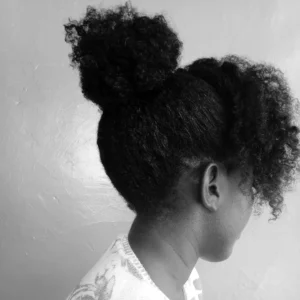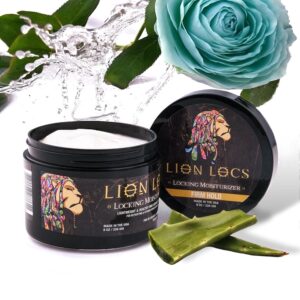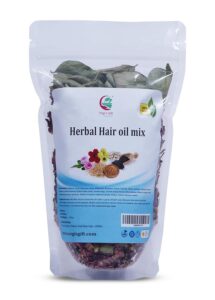Dealing with dandruff can be frustrating, especially when you’re trying to maintain healthy, beautiful 4C natural hair. Dandruff is a common scalp condition characterized by flaking, itching, and irritation. While it’s often not harmful, it can affect your confidence, make styling your hair challenging, and even lead to hair breakage if left untreated.
If you have 4C natural hair, it’s especially important to know what causes dandruff and how to prevent it. 4C hair is naturally dry because its tight curls make it harder for oils to travel down the hair shaft. This makes maintaining a healthy scalp even more crucial to avoid issues like dandruff. In this blog post, we’ll explore the major causes of dandruff on 4C natural hair, how to prevent it, and ways to manage it effectively.
Feel like your hair has been the same length forever, I’ve an Ebook that will help you grow your hair healthier, longer and thicker. Grab your copy here… Also, check out all the Ebooks,guides and journals that will go a long way in your hair care journey here.
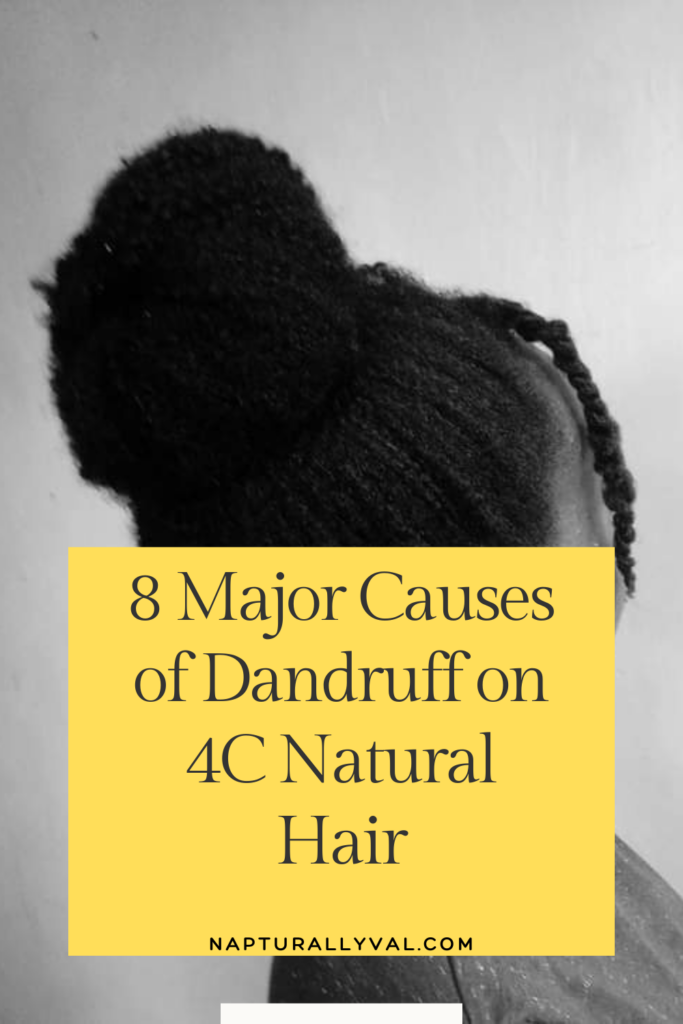
Table of Contents
Dandruff on 4C Natural Hair? Here’s Exactly Why and How to Stop It.
What is Dandruff?
Before we dive into the causes, let’s clarify what dandruff actually is. Dandruff occurs when the scalp sheds excess dead skin cells. It is typically associated with flaking and itching, and the flakes can range from small and white to large and yellowish. It’s important to note that dandruff is different from a dry scalp, though they share some similar symptoms. Dandruff is usually caused by a combination of scalp conditions, and in some cases, it can be aggravated by certain hair care practices or products.
Major Causes of Dandruff on 4C Natural Hair
1. Seborrheic Dermatitis
One of the leading causes of dandruff is seborrheic dermatitis, a skin condition that affects oily areas of the body, including the scalp. Seborrheic dermatitis causes red, scaly patches and persistent dandruff. In 4C hair, this condition can be more difficult to detect because of the natural tight curls that hide the scalp. The inflammation caused by seborrheic dermatitis often leads to excessive flaking and itching, which can be mistaken for regular dandruff.
How to Manage It: If seborrheic dermatitis is the cause of your dandruff, using a medicated anti-dandruff shampoo containing ingredients like zinc pyrithione, ketoconazole, or selenium sulfide can help reduce the inflammation and control flaking. You should also avoid using heavy oils or products that can clog the pores and make the condition worse.
2. Product Buildup
Product buildup is a common issue for people with 4C hair due to the frequent use of oils, butters, leave-in conditioners, and styling gels. These products can accumulate on the scalp over time, blocking the pores and preventing the scalp from breathing. When the scalp becomes clogged, it can cause irritation, itching, and dandruff-like flakes.
How to Manage It: Incorporate a clarifying shampoo into your routine to remove buildup from your scalp and hair. Clarifying shampoos are designed to deeply cleanse the scalp and eliminate residue left behind by heavy products. However, be mindful not to use clarifying shampoos too frequently, as they can also strip moisture from your hair. Once a month is typically sufficient, depending on your product usage.
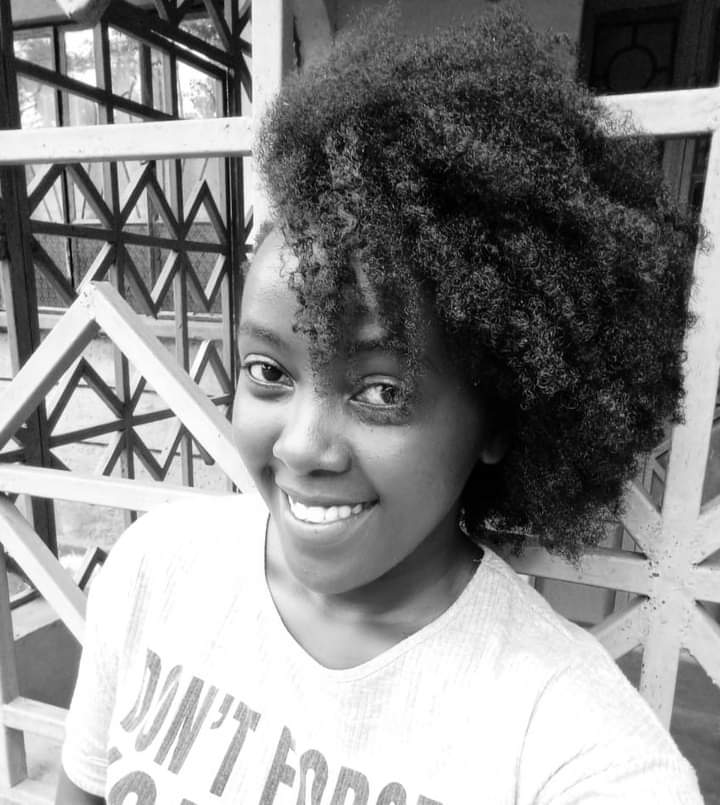
3. Dry Scalp
Many people with 4C hair struggle with a dry scalp due to the natural shape of their curls. The tight coils in 4C hair make it difficult for sebum (the scalp’s natural oil) to travel down the hair shaft, which can lead to dryness and, in turn, flaking. A dry scalp may mimic dandruff symptoms like itching and white flakes, but the root cause is actually a lack of moisture.
How to Manage It: To combat a dry scalp, keep your scalp hydrated by regularly moisturizing it with lightweight oils like jojoba, grapeseed, or argan oil. You can also use water-based leave-in conditioners that help replenish moisture. In addition, deep condition your hair at least once or twice a month to maintain both hair and scalp moisture.
4. Fungal Infection (Malassezia)
A fungus called Malassezia is one of the most common contributors to dandruff. This fungus naturally lives on the scalp, but when it grows out of control, it can lead to excessive skin cell turnover, resulting in dandruff. Malassezia thrives in environments that are both oily and sweaty, which is why people who use a lot of heavy hair products or those who don’t wash their hair regularly may experience more dandruff.
How to Manage It: Anti-fungal treatments are effective for managing dandruff caused by Malassezia. Use shampoos that contain ingredients like ketoconazole, coal tar, or tea tree oil, which have antifungal properties. It’s also a good idea to wash your hair and scalp more frequently to prevent oil and sweat buildup, which can encourage fungal growth.

5. Lack of Proper Scalp Hygiene
Caring for your scalp is just as important as caring for your hair. If you’re not cleansing your scalp regularly, it can lead to clogged pores, product buildup, and ultimately dandruff. In particular, if you frequently wear protective styles like braids or twists, you may go longer between washes, which can contribute to dandruff.
How to Manage It: Make sure you’re regularly cleansing your scalp, even if you’re wearing protective styles. You can use a diluted shampoo in a spray bottle or a scalp cleanser to clean your scalp without disturbing your protective style. Be gentle when cleansing, and follow up with a moisturizing conditioner to keep your scalp balanced.
6. Stress
Believe it or not, stress can also be a major factor in the development of dandruff. Stress can disrupt the balance of hormones in your body, leading to an overproduction of sebum and triggering scalp conditions like seborrheic dermatitis. When your body is under stress, your immune system weakens, which can make it more difficult to fight off scalp infections and fungal growth.
How to Manage It: While stress is unavoidable at times, finding healthy ways to manage it can help reduce its impact on your scalp and overall health. Consider incorporating stress-relieving activities into your daily routine, such as yoga, meditation, or regular exercise. Keeping your mind and body in balance can significantly reduce dandruff and other stress-related skin conditions.
7. Diet and Nutrition
Your diet plays a significant role in the health of your hair and scalp. A lack of essential nutrients like zinc, biotin, and omega-3 fatty acids can lead to scalp issues, including dandruff. Omega-3s, in particular, help to keep your scalp hydrated and reduce inflammation, while zinc helps to regulate the production of sebum on the scalp.
How to Manage It: Ensure you’re eating a balanced diet that includes plenty of vitamins and minerals to support your scalp health. Incorporate foods rich in omega-3 fatty acids (like salmon, walnuts, and flaxseeds), zinc (found in pumpkin seeds and oysters), and biotin (found in eggs, nuts, and seeds) to keep your scalp nourished and healthy. If you’re struggling to get enough nutrients from your diet, you may want to consider taking supplements.
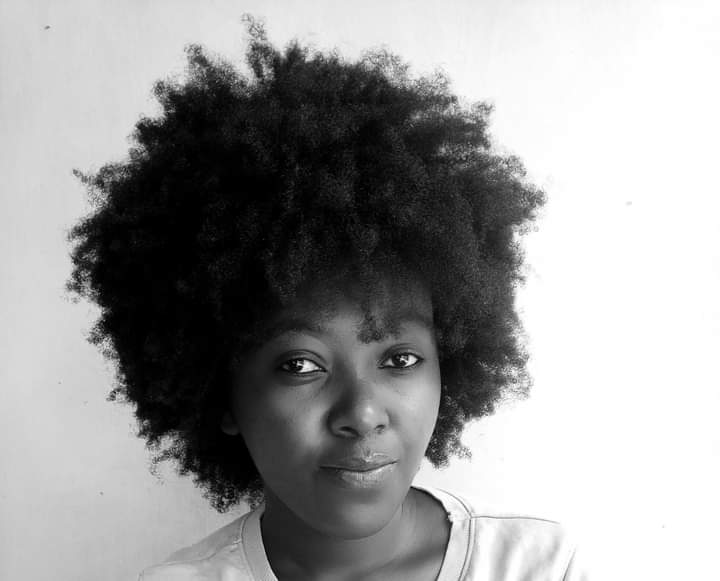
8. Weather and Environmental Factors
Cold, dry weather can strip moisture from both your skin and scalp, leading to dandruff. On the flip side, humid and hot environments can cause sweat and oil buildup on your scalp, which can also contribute to dandruff. Seasonal changes may exacerbate dandruff symptoms, especially for those with 4C hair that is already prone to dryness.
How to Manage It: During colder months, make sure to protect your scalp by wearing a hat or scarf, and increase the frequency of your moisturizing treatments to keep your scalp hydrated. In hotter weather, wash your hair more frequently to remove sweat and oil buildup, and use lightweight products to avoid clogging your pores.
How to Prevent and Treat Dandruff on 4C Natural Hair
Now that we’ve explored the major causes of dandruff, let’s talk about how to treat and prevent it. Here are some key tips for keeping dandruff at bay on 4C natural hair:
- Use a Dandruff Shampoo: Medicated shampoos containing active ingredients like zinc pyrithione, salicylic acid, ketoconazole, or selenium sulfide can help control dandruff. Use these shampoos once or twice a month, depending on the severity of your dandruff.
- Keep Your Scalp Moisturized: Regularly moisturize your scalp with lightweight oils or water-based leave-in conditioners to combat dryness. Avoid using heavy oils or greases that can clog pores.
- Deep Condition Weekly: A weekly deep conditioning treatment can help replenish moisture to both your hair and scalp. Look for deep conditioners that contain hydrating ingredients like aloe vera, shea butter, or glycerin.
- Avoid Product Overload: Be mindful of how many products you’re applying to your hair and scalp. Using too many products can lead to buildup, which can aggravate dandruff. Stick to a minimal hair care routine that prioritizes moisture and scalp health.
- Exfoliate Your Scalp: Just like your skin, your scalp can benefit from exfoliation. Use a gentle scalp massager to remove dead skin cells and buildup from your scalp once a month. This will help your scalp breathe and reduce the chances of dandruff.
- Stay Hydrated: Drinking plenty of water helps keep your scalp hydrated from the inside out. Aim for at least glasses of water per day to promote scalp health.
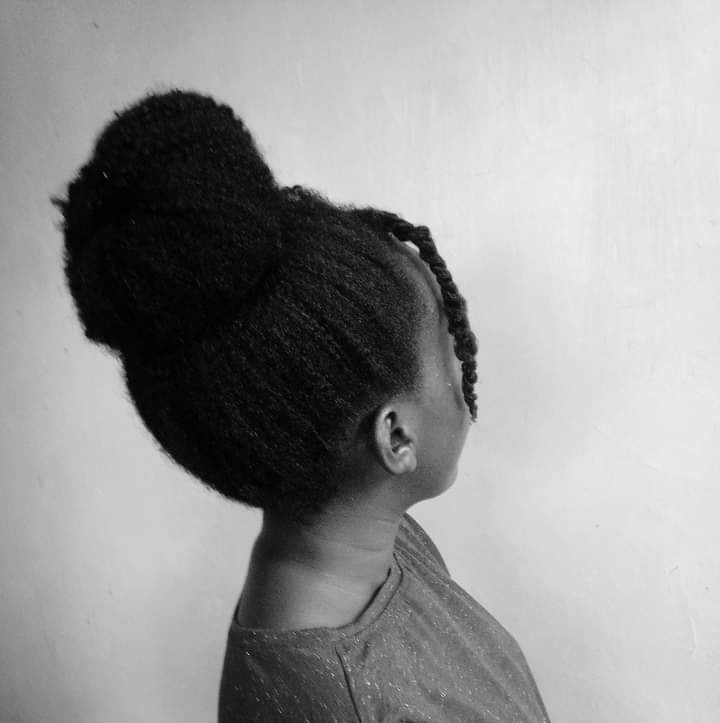
Dandruff can be an annoying issue, but with the right care and attention, it’s entirely manageable. By understanding the major causes of dandruff on 4C natural hair—like product buildup,
dry scalp, fungal infections, and seborrheic dermatitis—you can take proactive steps to prevent and treat it. Incorporating scalp-friendly products, maintaining proper hygiene, and keeping your scalp moisturized are essential for healthy, dandruff-free hair.
By following these tips and being consistent with your hair care routine, you can enjoy healthy, flake-free hair and a scalp that feels as good as it looks.

